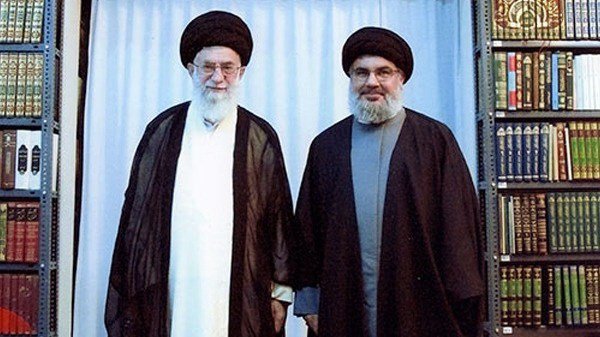The Lebanese state: Hostage or Iranian lackey?
مكرم رباح: الدولة اللبنانية: هل هي رهيننة إيرانية أم خادمة للنظام الإيراني
Makram Rabah/Al Arabiya/June 21/18
The Lebanese experiment at state building has been one of many ebbs and flows, mired with many complications several of which self-inflicted by the Lebanese themselves.
During the 15 years of civil war (1975-1990) and despite the many burdens and foreign occupation of its lands, the Lebanese state fought hard to prevent its total collapse, and succeed in sustaining a somewhat healthy relationship with the international community as well as its Arab surroundings.
At present, the same cannot be said about Lebanon and its defunct state, which has hit rock bottom due to the failure of its political elite to address a number of key issues that are pivotal for Lebanon’s future. These menacing challenges involve an abysmal response to the failing economy but more importantly to Iran’s growing influence over all aspect of the Lebanese state.
Iran’s Lebanese allies, among them the incumbent president Michel Aoun, have often dismissed these allegations as trivial refusing to acknowledge the fact that his relationship with Iran and the laxity he has exhibited towards Iran’s expansions has further alienated Lebanon and exposed it to potential sanctions.
A recent Foreign Policy article has blatantly accused the Lebanese authorities of trying to sway the Paraguay to extradite a Nader Mohamad Farhat accused of operating a drug trafficking and money laundering network in South America with direct ties to Hezbollah.
According to the US publication, Lebanese charge d’affairs in Asunción, Hassan Hijazi, sent an official letter to Paraguay’s attorney general trying to influence his decision to extradite Farhat to the US where he will stand trial.
Faced with this grave accusation, the Lebanese Ministry of Foreign Affairs headed by Aoun’s son-in-law and political heir, Gebran Bassil, simply released an official statement denying the charges put forth by the article, without providing any logic or proof to the contrary.
Iran and its militias might have more missiles and men than the Lebanese state, but if the latter truly wants to survive this gale, it has to adopt a truly steadfast policy
Discretion and foresight
Such a feeble denial would have been satisfactory had the Lebanese state practiced more discretion and foresight in some of its recent activities. Most of the affairs mentioned above when juxtaposed with these recent allegations portrays the Lebanese state as a culprit rather than a victim of Iran and Hezbollah’s expansionist agenda.
First of these measures is a presidential decree which granted Lebanese nationality to around 400 individuals some of whom are shrouded with corruption charges and have acted as facilitators and fronted for the Assad and Iranian regime.
While Aoun has full authority to grant these people citizenship, such a measure threatens Lebanon’s national and financial security as it invites sanctions form the international community, particularly the US, which will cripple Lebanon’s central banking sector.
An equally controversial issue shortly followed both these drug and naturalization scandals, as news spread that Iranian nationals entering Lebanon were no longer required to stamp their passports.
This simple bureaucratic measure was construed by many as mainly facilitating the entry of members of the Iranian Revolutionary Guards Corps- IRGC that have been using the Beirut Airport as a hub for their Syrian operations.
The Rafik Hariri International Airport is of particular interest not because it is Lebanon’s only functioning airport but also because it was the pretext Hezbollah used to try to violently overthrow the Siniora government in May of 2008.
This failed coup came as a response to allegations that Hezbollah had installed surveillance equipment to monitor the airport in addition to using it to smuggle weapons and ammunitions.
Iranian exemption
Consequently, this recent controversy surrounding the exemption of the Iranian from passport stamping only complicates matters further and reinforces the notion, to both the Lebanese and the entire world, that Lebanon is not only an unfortunate hostage of Iran but also rather a keen partner.
Perhaps the crux of the problem goes beyond the fact that the Lebanese state is totally silent over much of these infringements on its sovereignty, but perhaps that the Iranian regime is extremely vocal and unashamed of its control over Lebanon.
Qasem Soleimani’s, the commander of the IRGC’s Quds Force, recent conceited statement that Hezbollah has clinched 74 out of 128 seats in Parliamentary elections is in itself a blatant disrespect for Lebanese sovereignty.
However, what is far worse is that none of the senior members of government including President Aoun and PM Saad al-Hariri felt the need to condemn this dangerous transgression.
The Lebanese state might perhaps be innocent of many of the charges that have been thrown at it over the past years, yet what is certain is that the Lebanese political establishment has failed to realize that part of pretending to be a state involves having the insight and instinct of self-preservation.
Iran and its militias might have more missiles and men than the Lebanese state, but if the latter truly wants to survive this gale, it has to adopt a truly steadfast policy that would restore Lebanon as a member of the international community and consequently relinquish all ties with Iran’s so-called axis of resistance.
*Makram Rabah is a lecturer at the American University of Beirut, Department of History. He is the author of A Campus at War: Student Politics at the American University of Beirut, 1967-1975. He tweets @makramrabah.instead of terrorism, sending goods instead of proxies across borders, is the objective. The regime is against that at all costs. It’s own actions are all anyone needs to verify that.























